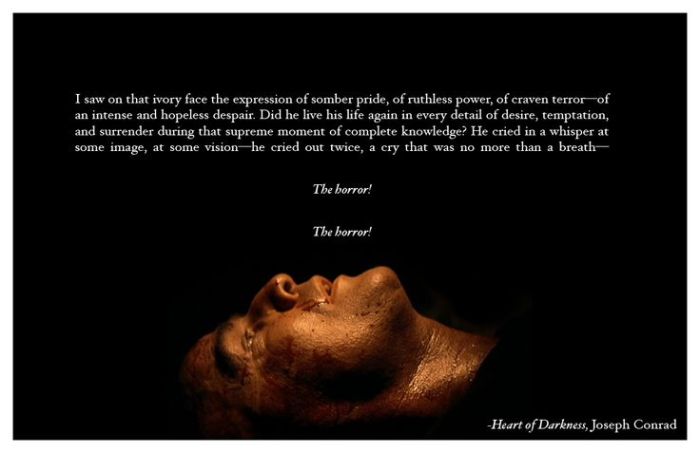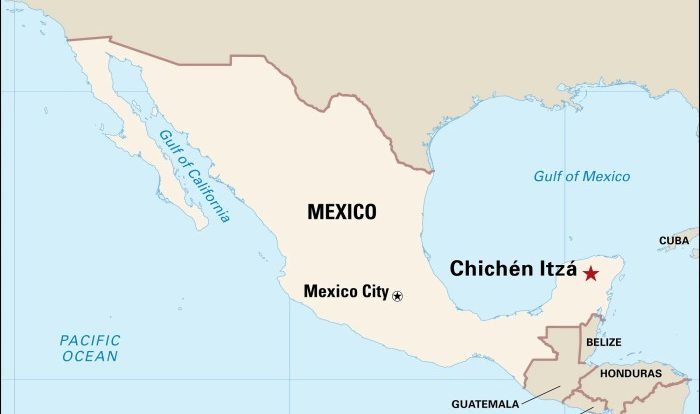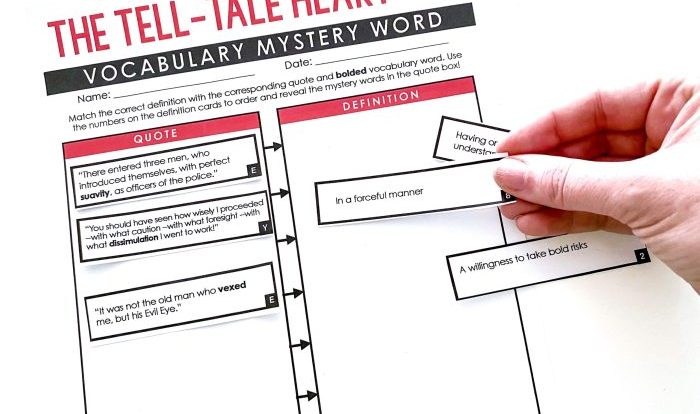Heart of darkness quotes about kurtz – Delving into the heart of darkness, this analysis of key quotes from Joseph Conrad’s masterpiece Heart of Darkness unveils the enigmatic nature of Kurtz, the enigmatic ivory trader at the heart of the novel’s exploration of colonialism, madness, and the darkness within human nature.
Through a close examination of specific quotations, we will explore Kurtz’s elusive qualities, the significance of the “heart of darkness” metaphor, the symbolism of his ivory trade, his complex relationship with the native population, Marlow’s evolving perceptions of Kurtz, and the lasting legacy of his actions and ideas.
The Enigma of Kurtz
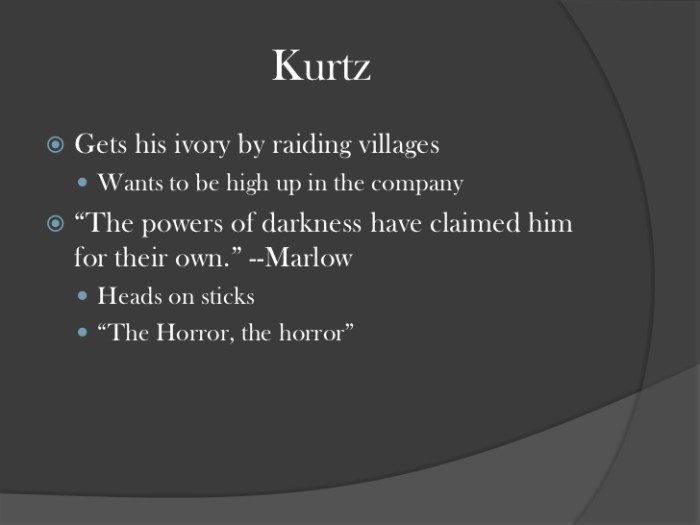
The character of Kurtz in Joseph Conrad’s “Heart of Darkness” is shrouded in mystery and intrigue. His enigmatic nature is conveyed through various quotes that highlight his elusive and complex qualities.
Kurtz’s Elusive Nature, Heart of darkness quotes about kurtz
Kurtz’s elusive nature is evident in the way he is described by other characters. Marlow, the narrator, remarks, “He was an inscrutable man, hidden in the heart of darkness.”
Another quote that highlights Kurtz’s elusiveness is, “He had summed up – he had judged. ‘The horror!’ He had been ‘initiated’ – he had looked deep into the heart of darkness.”
These quotes suggest that Kurtz is a man of mystery, whose true nature is difficult to comprehend. He is a figure who is both fascinating and terrifying, and his enigmatic qualities add to his overall mystique.
The Heart of Darkness
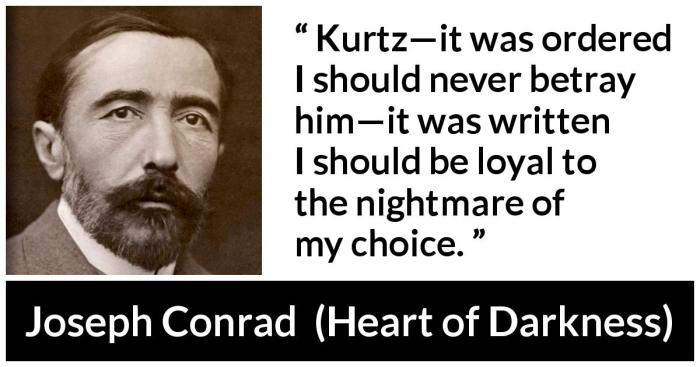
The Heart of Darkness Metaphor
The “heart of darkness” metaphor is central to the novella, representing the primal, savage instincts that lie beneath the veneer of civilization. It is through Kurtz’s journey into the Congo that this darkness is laid bare, as he succumbs to the temptations of power and the allure of the unknown.
Quotes and Analysis
- “He had taken a high seat amongst the devils of the land.”– Marlow
- “He had something to say. He wanted to say it even to me, who had not asked him. `Yes, I know,’ he cried, writhing on the couch. `I am lying here in the dark waiting for death. The last word he pronounced was—your name.”– Marlow
- “He had taken a high seat amongst the devils of the land—I mean literally.”– Marlow
This quote suggests that Kurtz has become corrupted by the darkness of the Congo, embracing the savagery and violence that surrounds him.
Kurtz’s dying words, uttering Marlow’s name, reveal the extent of his descent into madness. He is consumed by the darkness and seeks solace in the one person who might understand his journey.
This quote reinforces the idea that Kurtz has become a symbol of the darkness that lurks within human nature, embodying the primal instincts that civilization seeks to suppress.
These quotes illuminate Kurtz’s transformation from a respected explorer to a savage tyrant, highlighting the destructive power of the “heart of darkness.” They reveal the fragility of civilization and the ease with which it can be corrupted by the darkness that lies within.
Kurtz’s Ivory Trade and its Symbolism: Heart Of Darkness Quotes About Kurtz
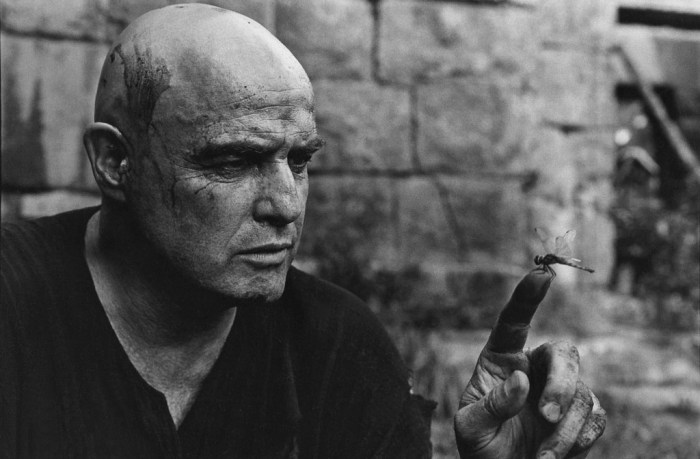
Kurtz’s ivory trade in Heart of Darknessserves as a potent symbol of his greed, exploitation, and the destructive impact of colonialism.
Ivory Trade and Exploitation
Kurtz’s ivory trade is described as a ruthless pursuit of wealth, with Marlow witnessing the “greed that had dragged him out there, and reduced him to nothing but a grabbing phantom” (Conrad, 1990, p. 97). The ivory represents the material gains Kurtz seeks at the expense of the native population, who are forced to labor under brutal conditions in the ivory camps.
“He had taken a high seat amongst the devils of the land- I mean literally” (Conrad, 1990, p. 99).
Ivory Trade and Colonialism
The ivory trade also symbolizes the destructive impact of colonialism, as it is a means of extracting resources from the Congo for the benefit of European powers. Kurtz’s exploitation of the natives mirrors the larger system of oppression and violence that characterizes colonialism.
“They were conquerors, and for that you want only brute force- nothing to boast of, when you have it, since your strength is just an accident arising from the weakness of others” (Conrad, 1990, p. 102).
Ivory Trade and Kurtz’s Descent into Darkness
Finally, the ivory trade contributes to Kurtz’s descent into darkness. The pursuit of wealth and power corrupts him, leading him to abandon his ideals and embrace the savagery of the jungle. The ivory becomes a symbol of his moral decay and the loss of his humanity.
“The wilderness had patted him on the head, and, behold, it was like a ball- an ivory ball!” (Conrad, 1990, p. 105).
Marlow’s Perspective on Kurtz
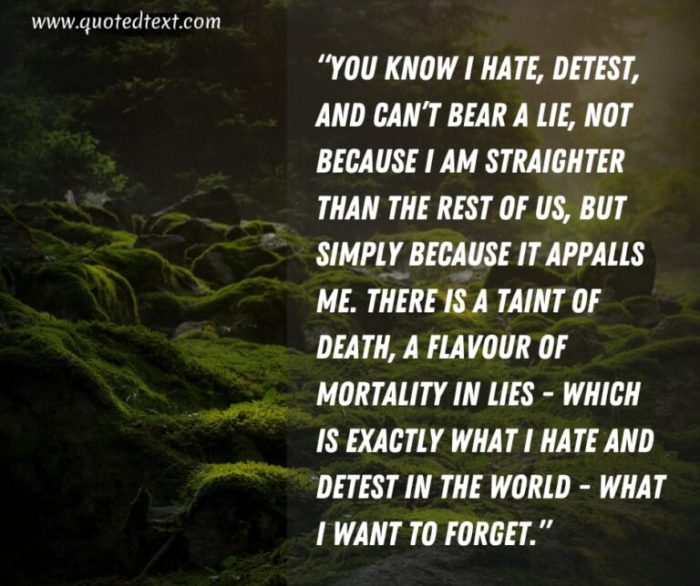
Marlow’s initial fascination with Kurtz stems from his reputation as a successful ivory trader and an enigmatic figure. Marlow is drawn to Kurtz’s charisma, intelligence, and the aura of mystery that surrounds him. However, as Marlow ventures deeper into the Congo, he witnesses firsthand the brutality and darkness that have consumed Kurtz.
Kurtz’s Initial Fascination
- “He was a remarkable man. He had something to say. He had a story to tell; he knew how to tell it; he could get himself believed.” (Marlow)
- “He had the power to charm or frighten rudimentary souls into an aggravated witch-dance in his honor.” (Marlow)
Subsequent Disillusionment
Marlow’s disillusionment with Kurtz begins when he encounters the atrocities committed by Kurtz’s followers. He sees the severed heads impaled on stakes and the brutal treatment of the native population. As Marlow approaches Kurtz’s inner sanctum, he finds Kurtz transformed into a physically and mentally broken man, consumed by his own darkness.
- “Kurtz had gone the way of all his predecessors, he had become the worm, the horror, the shame.” (Marlow)
- “His end was in every way a complete desolation.” (Marlow)
Marlow’s perspective shapes our understanding of Kurtz by revealing the duality of his character. Kurtz is both a brilliant and charismatic individual and a ruthless tyrant. Marlow’s journey serves as a cautionary tale about the dangers of unchecked ambition and the corrosive effects of power.
The Legacy of Kurtz
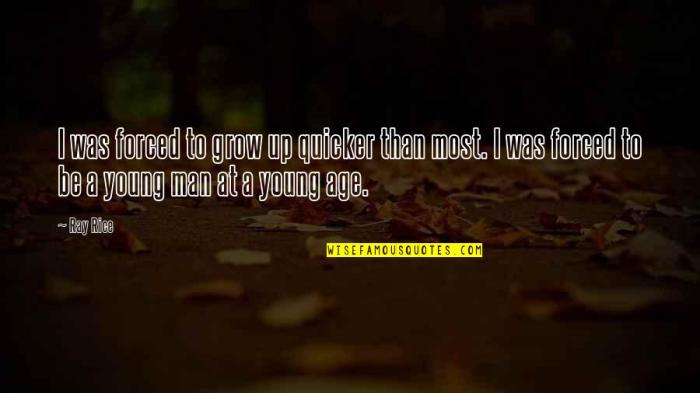
Kurtz’s actions and ideas have a profound and lasting impact on the characters and the world of the novel. His legacy continues to haunt the characters and influence the events of the novel long after his death.
Kurtz’s Impact on Marlow
- Marlow is deeply affected by his encounter with Kurtz. He is haunted by Kurtz’s words and actions, and he struggles to come to terms with the darkness that he has seen in Kurtz.
- Marlow’s journey up the Congo River is a journey into the heart of darkness, and Kurtz is the embodiment of that darkness. Marlow’s encounter with Kurtz forces him to confront his own darkness, and he is ultimately changed by the experience.
Kurtz’s Impact on the Other Characters
- Kurtz’s actions have a devastating impact on the other characters in the novel. The Russian trader is driven to madness by Kurtz’s cruelty, and the Intended is left heartbroken and alone after Kurtz’s death.
- Kurtz’s legacy continues to haunt the other characters long after his death. The Intended is unable to move on with her life, and the Russian trader is eventually killed by Kurtz’s followers.
Kurtz’s Impact on the World of the Novel
- Kurtz’s actions have a profound impact on the world of the novel. His ivory trade devastates the local population, and his cruelty and violence create a climate of fear and terror.
- Kurtz’s legacy continues to haunt the world of the novel long after his death. The ivory trade continues to thrive, and the violence and terror that Kurtz unleashed continues to plague the land.
Detailed FAQs
What is the significance of the “heart of darkness” metaphor in relation to Kurtz?
The “heart of darkness” metaphor represents the primal and savage instincts that lurk within human nature, which Kurtz’s descent into madness and his exploitation of the native population embody.
How does Kurtz’s ivory trade reflect his greed and the destructive impact of colonialism?
Kurtz’s ivory trade symbolizes his insatiable greed and the ruthless exploitation of the native population, mirroring the destructive effects of colonialism on both the land and its people.
How does Marlow’s perspective on Kurtz shape our understanding of the character and the themes of the novel?
Marlow’s initial fascination with Kurtz and his subsequent disillusionment provide a nuanced perspective on Kurtz’s character and the novel’s themes of colonialism, madness, and the darkness within human nature.
